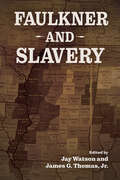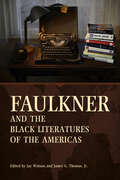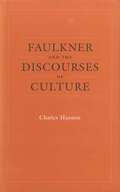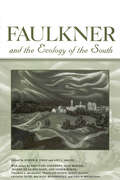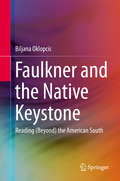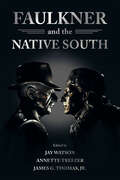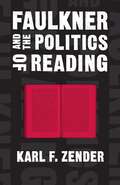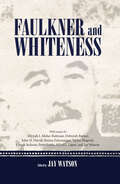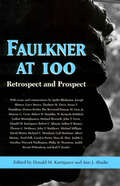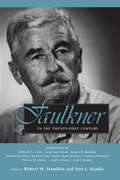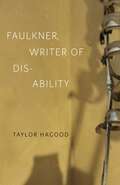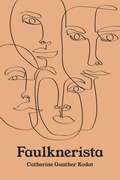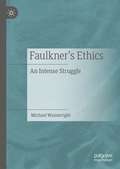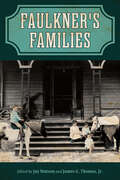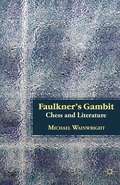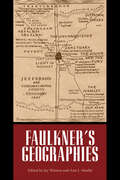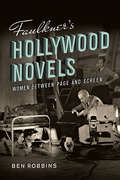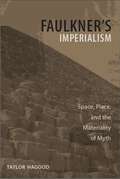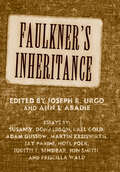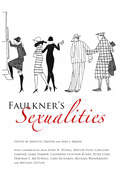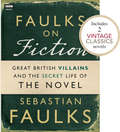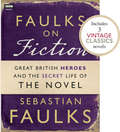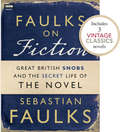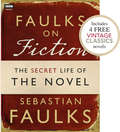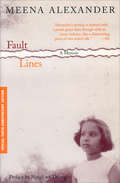- Table View
- List View
Faulkner and Slavery (Faulkner and Yoknapatawpha Series)
by Jay Watson and James G. ThomasContributions by Tim Armstrong, Edward A. Chappell, W. Ralph Eubanks, Amy A. Foley, Michael Gorra, Sherita L. Johnson, Andrew B. Leiter, John T. Matthews, Julie Beth Napolin, Erin Penner, Stephanie Rountree, Julia Stern, Jay Watson, and Randall WilhelmIn 1930, the same year he moved into Rowan Oak, a slave-built former plantation home in his hometown of Oxford, Mississippi, William Faulkner published his first work of fiction that gave serious attention to the experience and perspective of an enslaved individual. For the next two decades, Faulkner repeatedly returned to the theme of slavery and to the figures of enslaved people in his fiction, probing the racial, economic, and political contours of his region, nation, and hemisphere in work such as The Sound and the Fury; Light in August; Absalom, Absalom!; and Go Down, Moses.Faulkner and Slavery is the first collection to address the myriad legacies of African chattel slavery in the writings and personal history of one of the twentieth century’s most incisive authors on US slavery and the long ordeal of race in the Americas. Contributors to the volume examine the constitutive links among slavery, capitalism, and modernity across Faulkner’s oeuvre. They study how the history of slavery at the University of Mississippi informs writings like Absalom, Absalom! and trace how slavery’s topologies of the rectilinear grid or square run up against the more reparative geography of the oval in Faulkner’s narratives. Contributors explore how the legacies of slavery literally sound and resound across centuries of history, and across multiple novels and stories in Faulkner’s fictional county of Yoknapatawpha, and they reveal how the author’s remodeling work on his own residence brought him into an uncomfortable engagement with the spatial and architectural legacies of chattel slavery in north Mississippi. Faulkner and Slavery offers a timely intervention not only in the critical study of the writer’s work but in ongoing national and global conversations about the afterlives of slavery and the necessary work of antiracism.
Faulkner and the Black Literatures of the Americas (Faulkner and Yoknapatawpha Series)
by Jay Watson And James G. Thomas Jr.Contributions by Ted Atkinson, Thadious M. Davis, Matthew Dischinger, Dotty Dye, Chiyuma Elliott, Doreen Fowler, Joseph Fruscione, T. Austin Graham, Rachel Eliza Griffiths, Derrick Harriell, Lisa Hinrichsen, Randall Horton, George Hutchinson, Andrew B. Leiter, John Wharton Lowe, Jamaal May, Ben Robbins, Tim A. Ryan, Sharon Eve Sarthou, Jenna Sciuto, James Smethurst, and Jay WatsonAt the turn of the millennium, the Martinican novelist Édouard Glissant offered the bold prediction that “Faulkner’s oeuvre will be made complete when it is revisited and made vital by African Americans,” a goal that “will be achieved by a radically ‘other’ reading.” In the spirit of Glissant’s prediction, this collection places William Faulkner’s literary oeuvre in dialogue with a hemispheric canon of black writing from the United States and the Caribbean. The volume’s seventeen essays and poetry selections chart lines of engagement, dialogue, and reciprocal resonance between Faulkner and his black precursors, contemporaries, and successors in the Americas.Contributors place Faulkner’s work in illuminating conversation with writings by Paul Laurence Dunbar, W. E. B. Du Bois, James Weldon Johnson, Jean Toomer, Nella Larsen, Claude McKay, Ralph Ellison, James Baldwin, Ernest J. Gaines, Marie Vieux-Chauvet, Toni Morrison, Edwidge Danticat, Randall Kenan, Edward P. Jones, and Natasha Trethewey, along with the musical artistry of Mississippi bluesman Charley Patton.In addition, five contemporary African American poets offer their own creative responses to Faulkner’s writings, characters, verbal art, and historical example. In these ways, the volume develops a comparative approach to the Faulkner oeuvre that goes beyond the compelling but limiting question of influence—who read whom, whose works draw from whose—to explore the confluences between Faulkner and black writing in the hemisphere.
Faulkner and the Discourses of Culture (Southern Literary Studies)
by Charles HannonThroughout his career, William Faulkner produced a literary discourse remarkably contiguous with other discourses of American culture, but seldom has his work been explored as a participant in the shifts and ruptures that characterize modern discursive systems. Charles Hannon argues in his brilliant new study that the language of Faulkner's fiction is replete with the voiced conflicts that shaped America and the South from the 1920s to1950. Specifically, Hannon takes five contemporary debates -- in historiography, law, labor, ethnography, and film -- and relates them both to canonical and less-discussed texts of Faulkner.Hannon employs a theoretical middle ground between Michael Bakhtin's stylistics of the novel and Michel Foucault's model of discourse as an autonomous self-regulated domain, while also drawing from the vast critical literature on Faulkner's fiction. He begins by linking the story cycle The Unvanquished to the battle over interpretations of American history as voiced by the Nashville Agrarians on the one hand and W. E. B. DuBois on the other. Next Hannon shows how Faulkner's detective fiction of the early 1930s and portions of his novel The Hamlet were affected by the emerging schism between adherents of a new school of legal realism and those bound to a more conservative formalist jurisprudence. According to Hannon, Faulkner's great novel Absalom, Absalom! reflects in its depiction of various forms of labor one of Franklin Roosevelt's major New Deal accomplishments -- the Wagner Act of 1935 -- as well as contract disputes in the agricultural and manufacturing South and in the film studios of Hollywood. Hannon discusses Faulkner's experimentation in The Hamlet vis-á-vis the development of the ethnographic method in the field of anthropology. He concludes with a fascinating analysis of the filming of Intruder in the Dust in Faulkner's hometown of Oxford, Mississippi.Through Hannon's keen interpretive readings, Faulkner's texts emerge as a complex "node" in the larger discursive conflicts of his time. Though he often seemed to be detached from influence, Faulkner was, Hannon reveals, intensely attentive to ideas at the fore.
Faulkner and the Ecology of the South (Faulkner and Yoknapatawpha Series)
by Joseph R. UrgoIn 1952, Faulkner noted the exceptional nature of the South when he characterized it as “the only really authentic region in the United States, because a deep indestructible bond still exists between man and his environment.” The essays collected in Faulkner and the Ecology of the South explore Faulkner's environmental imagination, seeking what Ann Fisher-Wirth calls the : “ecological counter-melody” of his texts. “Ecology” was not a term in common use outside the sciences in Faulkner's time. However, the word “environment” seems to have held deep meaning for Faulkner. Often he repeated his abiding interest in “man in conflict with himself, with his fellow man, or with his time and place, his environment.” Eco-criticism has led to a renewed interest among literary scholars for what in this volume Cecelia Tichi calls, “humanness within congeries of habitats and environments.” Philip Weinstein draws on Pierre Bourdieu's notion of habitus. Eric Anderson argues that Faulkner's fiction has much to do with ecology in the sense that his work often examines the ways in which human communities interact with the natural world, and François Pitavy sees Faulkner's wilderness as unnatural in the ways it represents reflections of man's longings and frustrations. Throughout these essays, scholars illuminate in fresh ways the precarious ecosystem of Yoknapatawpha County.
Faulkner and the Native Keystone
by Biljana OklopcicThe last fifty years have witnessed a never-ending flow of criticism of William Faulkner and his fiction. While this book touches on the prevailing critical theory, it concentrates on a number of fresh observations on themes and motifs that place William Faulkner's fiction in general, regional, global and universal contexts of American and Western literature. Paying special attention to themes and motifs of racism, sexism, women's education, myths and stereotypes - to mention just a few -- the book analyzes Faulkner's ability to write and to be read within and beyond his "native keystone" - his South. Coming from a non US-Americanist perspective, this contribution to the scholarly literature on William Faulkner discusses his best-known novels, contends that regionalism, internationalism and universalism are the context of his fiction and argues for feminist, post-colonial, and psychoanalytical approaches to it. The book is intended for scholars in the field of American literature, American Studies and Southern Studies as it covers the South's complex history, its peculiar cultural institutions and the daunting body of international critical studies that has flourished around the novels during the last five decades. Graduate students will also find this book useful as it analyzes and interprets the novels and short stories of one of the greatest American novelists of the 20th century in an easily understandable way, offering new and fresh readings on (1) race and gender stereotypes present in American and European culture and literature, (2) conventions of family/genealogical fiction/drama and (3) universal life situations and feelings.
Faulkner and the Native South (Faulkner and Yoknapatawpha Series)
by Jay Watson, Annette Trefzer and James G. ThomasContributions by Eric Gary Anderson, Melanie R. Anderson, Jodi A. Byrd, Gina Caison, Robbie Ethridge, Patricia Galloway, LeAnne Howe, John Wharton Lowe, Katherine M. B. Osburn, Melanie Benson Taylor, Annette Trefzer, and Jay Watson From new insights into the Chickasaw sources and far-reaching implications of Faulkner’s fictional place-name “Yoknapatawpha,” to discussions that reveal the potential for indigenous land-, family-, and story-based methodologies to deepen understanding of Faulkner’s fiction (including but not limited to the novels and stories he devoted explicitly to Native American topics), the eleven essays of this volume advance the critical analysis of Faulkner’s Native South and the Native South’s Faulkner. Critics push beyond assessments of the historical accuracy of his Native representations and the colonial hybridity of his Indian characters. Essayists turn instead to indigenous intellectual culture for new models, problems, and questions to bring to Faulkner studies. Along the way, readers are treated to illuminating comparisons between Faulkner’s writings and the work of a number of Native American authors, filmmakers, tribal leaders, and historical figures. Faulkner and the Native South brings together Native and non-Native scholars in a stimulating and often surprising critical dialogue about the indigenous wellsprings of Faulkner’s creative energies and about Faulkner’s own complicated presence in Native American literary history.
Faulkner and the Politics of Reading (Southern Literary Studies)
by Karl F. ZenderWith this study Karl F. Zender offers fresh readings of individual novels, themes, and motifs while also assessing the impact of recent politicized interpretations on our understanding of Faulkner’s achievement. Sympathetically acknowledging the need to decenter the canon, Zender’s searching interrogation of current theory clears a breathing space for Faulkner and his readers between the fustier remnants of New Criticism and the excesses of post-structuralism.Each chapter opens with a balanced presentation of the genuine gifts contemporary theory has bestowed on our comprehension of a particular novel or problem in Faulkner criticism and then proceeds with a groundbreaking reading. “The Politics of Incest” challenges older psychoanalytic interpretations of Faulkner’s use of the incest motif, and “Faulkner’s Privacy” defends the novelist’s difficulty or “reticence” as an aesthetic resistance against the rude candor of deregionalized and depersonalized culture. Subsequent chapters take up the volatile issues of Faulkner’s representations of women and of African Americans, and a close reading of the classic “Barn Burning” critiques the current tendency to blur the concepts of patriarchy and paternity. The elegiac final chapter, “Where is Yoknapatawpha County?” draws on a comparison with John Updike’s Pennsylvania fiction and a reading of Joan Williams’s The Wintering to explore Faulkner’s disinclination to represent the quotidian realities of southern life in his later novels. Zender shows that Faulkner’s stylistic withdrawal attempts to “transform into beauty” his alienation from the postwar world and his fear of aging. That Faulkner and the Politics of Reading itself recovers and gives new luster to Faulkner’s beauty will surely please, in the author’s words, “those readers . . . for whom literature is less a mechanism of social change than a source of pleasure.” The originality of its critical vision will inspire Faulkner scholars, students of American literature, and general readers.
Faulkner and Whiteness
by Jay WatsonWilliam Faulkner wrote during a tumultuous period in southern racial consciousness, between the years of the enactment of Jim Crow and the beginnings of the civil rights movement in the South. Throughout the writer's career, racial paradigms were in flux, and these shifting notions are reflected in Faulkner's prose. Faulkner's fiction contains frequent questions about the ways in which white Americans view themselves with regard to race along with challenges to the racial codes and standards of the region, and complex portrayals of the interactions between blacks and whites. Throughout his work, Faulkner contests white identity—its performance by whites and those passing for white, its role in shaping the South, and its assumption of normative identity in opposition to non-white “Others.” This is true even in novels without a strong visible African American presence, such as As I Lay Dying, The Hamlet, The Town, and The Mansion. Faulkner and Whiteness explores the ways in which Faulkner's fiction addresses and destabilizes the concept of whiteness in American culture. Collectively, the essays argue that whiteness, as part of the Nobel Laureate's consistent querying of racial dynamics, is a central element. This anthology places Faulkner's oeuvre—and scholarly views of it—in the contexts of its contemporary literature and academic trends exploring race and texts.
Faulkner at 100: Retrospect and Prospect (Faulkner and Yoknapatawpha Series)
by Donald M. Kartiganer J. AbadieWilliam Faulkner was born September 25, 1897. In honor of his centenary the Faulkner and Yoknapatawpha Conference of 1997 brought together twenty-five of the most important Faulkner scholars to examine the achievement of this writer generally regarded as the finest American novelist of the twentieth century. The essays and panel discussions that make up Faulkner at 100: Retrospect and Prospect provide a comprehensive account of the man and his work, including discussions of his life, the shape of his career, and his place in American literature, as well as fresh readings of such novels as The Sound and the Fury, Absalom, Absalom!, If I Forget Thee, Jerusalem, and Go Down, Moses. What emerges from this commemorative volume is a plural Faulkner, a writer of different value and meaning to different readers, a writer still challenging readers to accommodate their highly varied approaches to what André Bleikasten calls Faulkner's abiding “singularity.”
Faulkner in the Twenty-First Century (Faulkner and Yoknapatawpha Series)
by Robert W. Hamblin Ann J. AbadieContributions by Deborah N. Cohn, Leigh Anne Duck, Robert W. Hamblin, Michael Kreyling, Barbara Ladd, Walter Benn Michaels, Patrick O'Donnell, Theresa M. Towner, Annette Trefzer, and Karl F. Zender Faulkner in the Twenty-First Century presents the thoughts of ten noted Faulkner scholars who spoke at the twenty-seventh annual Faulkner and Yoknapatawpha Conference at the University of Mississippi. Theresa M. Towner attacks the traditional classification of Faulkner's works as “major” and “minor” and argues that this causes the neglect of other significant works and characters. Michael Kreyling uses photographs of Faulkner to analyze the interrelationships of Faulkner's texts with the politics and culture of Mississippi. Barbara Ladd and Deborah Cohn invoke the relevance of Faulkner's works to “the other South,” postcolonial Latin America. Also, approaching Faulkner from a postcolonial perspective, Annette Trefzer looks at his contradictory treatment of Native Americans. Within the tragic fates of such characters as Quentin Compson, Gail Hightower, and Rosa Coldfield, Leigh Ann Duck finds an inability to cope with painful memories. Patrick O'Donnell examines the use of the future tense and Faulkner's growing skepticism of history as a linear progression. To postmodern critics who denigrate “The Fire and the Hearth,” Karl F. Zender offers a rebuttal. Walter Benn Michaels contends that in Faulkner's South, and indeed the United States as a whole, the question of racial identification tends to overpower all other issues. Faulkner's recurring interest in frontier life and values inspires Robert W. Hamblin's piece.
Faulkner, Writer of Disability (Southern Literary Studies)
by Taylor HagoodFrom the emerging field of disability studies, Taylor Hagood offers the first book-length consideration of impairment in William Faulkner's life and writing. Blending biography, textual analysis, and theory in an experimental style, Hagood explores in both form and content the constructs of normality and their power. Hagood brings to light little-known and rarely discussed ways in which Faulkner's personal and familial background were marked by disability and discusses the ways the writer incorporates disability into his fiction. He reevaluates Faulkner's so-called "idiots"-Benjy Compson, Ike Snopes, and others-as characters whose narratives both satisfy and shock the reader. Hagood also examines the roles that impairment and abnormality play in texts such as the stories "The Leg" and "The Kingdom of God" and the novels A Fable and Flags in the Dust. Highly original readings result, including new understandings of: the centrality of the visually impaired Pap in Sanctuary; the disability-centric social order based on interdependence in Pylon; and the disabled speech of Linda Snopes Kohl in The Mansion. Hagood argues that Faulkner's poetics are deeply invested in disability, both in promoting a disability-inclusive fictional world and in exposing and subverting the devaluation of disabled bodies and minds. Hagood draws on firsthand knowledge of his native of Ripley, Mississippi, the ancestral home of the Faulkners, to offer readers otherwise inaccessible contextual information. Moreover, by framing each section of his study within a different kind of discourse-newspaper style, biography, email, and advertisement-he uses the very structure of the book to underscore the questions of normalcy prevalent in disability studies. This rich and unconventional study offers insight into a Faulkner haunted by experiences of disablement and compelled to narrate them in his own writing.
Faulknerista
by Catherine G. KodatFaulknerista collects more than twenty years of critically influential scholarship by Catherine Gunther Kodat on the writings of one of the most important American authors of the twentieth century, William Faulkner. Initially composed as freestanding essays and now updated and revised, the book’s nine chapters place Faulkner’s work in the context of current debates concerning the politics of white authors who write about race, queer sexualities, and the use of the N-word in literature and popular culture. The Faulknerista of the title is a critic who tackles these debates without fear or favor, balancing admiration with skepticism in a manner that establishes a new model for single-author scholarship that is both historically grounded (for women have been writing about Faulkner, and talking back to him, since the beginning of his career) and urgently contemporary. Beginning with an introduction that argues for the critical importance of women’s engagement with Faulkner’s fiction, through comparative discussions pairing it with works by Toni Morrison, Jean-Luc Godard, Quentin Tarantino, and David Simon, Faulknerista offers a valuable resource for students, scholars, and general readers, written in an accessible style and aimed at stimulating discussions of Faulkner’s work and the rich interpretive challenges it continues to present.
Faulkner’s Ethics: An Intense Struggle
by Michael WainwrightThis book offers the first comprehensive investigation of ethics in the canon of William Faulkner. As the fundamental framework for its analysis of Faulkner’s fiction, this study draws on The Methods of Ethics, the magnum opus of the utilitarian philosopher Henry Sidgwick. While Faulkner’s Ethics does not claim that Faulkner read Sidgwick’s work, this book traces Faulkner’s moral sensitivity. It argues that Faulkner’s language is a moral medium that captures the ways in which people negotiate the ethical demands that life places on them. Tracing the contours of this evolving medium across six of the author’s major novels, it explores the basic precepts set out in The Methods of Ethics with the application of more recent contributions to moral philosophy, especially those of Jacques Derrida and Derek Parfit.
Faulkner's Families (Faulkner and Yoknapatawpha Series)
by Jay Watson and James G. ThomasContributions by Josephine Adams, Jeff Allred, Garry Bertholf, Maxwell Cassity, John N. Duvall, Katherine Henninger, Maude Hines, Robert Jackson, Julie Beth Napolin, Rebecca Nisetich, George Porter Thomas, Jay Watson, and Yuko YamamotoIf it seems outrageous to suggest that one of the twentieth century’s most important literary cartographers of the private recesses of consciousness is also among its great novelists of family, William Faulkner nonetheless fits the bill on both counts. Family played an outsized role in both his life and his writings, often in deeply problematic ways, surfacing across his oeuvre in a dazzling range of distorted, defamiliarized, and transgressive forms, while on other occasions serving as a crucible for crushing forces of conformity, convention, and tradition. The dozen essays featured in this collection approach Faulkner’s many families—actual and imagined—as especially revealing windows to his work and his world. Contributors explore the role of the child in Faulkner’s vision of family and regional society; sibling relations throughout the author's body of work; the extension of family networks beyond blood lineage and across racial lines; the undutiful daughters of Yoknapatawpha County; the critical power of family estrangement and subversive genealogies in Faulkner’s imagination; forms of queer and interspecies kinship; the epidemiological imagination of Faulkner’s notorious Snopes family as social contagion; the experiences of the African American families who worked on the writer’s Greenfield Farm property; and Faulkner’s role in promoting a Cold War–era ideology of “the family of man” in post–World War II Japan.
Faulkner’s Gambit
by Michael WainwrightThis book offers the first full-length study of the chess structures, motifs, and imagery in William Faulkner's Knight's Gambit . Wainwright looks at the importance of chess as a literary device and examines the structural analogy drawn between the game and linguistics by Ferdinand de Saussure.
Faulkner's Geographies: Faulkner And Yoknapatawpha, 2011 (Faulkner and Yoknapatawpha Series)
by Jay Watson Ann J. AbadieThe recent spatial turn in social theory and cultural studies opens up exciting new possibilities for the study of William Faulkner's literature. The fictional domains of Yoknapatawpha County and Jefferson, Mississippi, are not simply imagined communities but imaginative geographies of remarkable complexity and detail, as evidenced by the maps Faulkner created of his “apocryphal” county. Exploring the diverse functions of space in Faulkner's artistic vision, the eleven essays in Faulkner's Geographies delve deep into Yoknapatawpha but also reach beyond it to uncover unsuspected connections and flows linking local, regional, national, hemispheric, and global geographies in Faulkner's writings. Individual contributions examine the influence of the plantation as a land-use regime on Faulkner's imagination of north Mississippi's geography; the emergence of “micro-Souths” as a product of modern migratory patterns in the urban North of Faulkner's fiction; the enlistment of the author's work in the geopolitics of the cultural Cold War during the 1950s; the historical and literary affiliations between Faulkner's Deep South and Greater Mexico; the local and idiosyncratic as alternatives to region and nation; the unique intersection of regional and metropolitan geographies that Faulkner encountered as a novice writer immersed in the literary culture of New Orleans; the uses of feminist geography to trace the interplay of gender, space, and movement; and the circulation of Caribbean and “Black South” spaces and itineraries through Faulkner's masterpiece, Absalom, Absalom! By bringing new attention to the function of space, place, mapping, and movement in his literature, Faulkner's Geographies seeks to redraw the very boundaries of Faulkner studies.
Faulkner's Hollywood Novels: Women between Page and Screen
by Ben RobbinsTracing the influence of Faulkner&’s screenwriting on his literary craft and depictions of women William Faulkner&’s time as a Hollywood screenwriter has often been dismissed as little more than an intriguing interlude in the career of one of America&’s greatest novelists. Consequently, it has not received the wide-ranging critical examination it deserves. In Faulkner&’s Hollywood Novels, Ben Robbins provides an overdue thematic analysis by systematically tracing a dialogue of influence between Faulkner&’s literary fiction and screenwriting over a period of two decades. Among numerous insights, Robbins&’s work sheds valuable new light on Faulkner&’s treatment of female characters, both in his novels and in the films to which he contributed. Drawing on extensive archival research, Robbins finds that Hollywood genre conventions and archetypes significantly influenced and reshaped Faulkner&’s craft after his involvement in the studio system. His work in the film industry also produced a deep exploration of the gendered dynamics of collaborative labor, genre formulae, and cultural hierarchies that materialized in both his Hollywood screenplays and his experimental fiction.
Faulkner's Imperialism: Space, Place, and the Materiality of Myth (Southern Literary Studies)
by Taylor HagoodIn Faulkner's Imperialism, Taylor Hagood explores two staples of Faulkner's world: myth and place. Using an interdisciplinary approach to examine the economic, sociological, and political factors in Faulkner's writing, he applies postcolonial theory, cultural materialism, and the work of the New Southernists to analyze the ways myth and place come together to encode narratives of imperialism -- and anti-imperialism -- in the worlds in which Faulkner lived and the one that he created. The resulting discussion highlights the deeply embedded imperial impulses underpinning not just Yoknapatawpha and Mississippi, but the Midwest, the Caribbean, France, and a host of often-overlooked corners of the Faulknerian map.Faulkner defines space in his fiction by creating places through culturally compelling narratives. Although these narrative spaces often have imperial roots, Hagood reveals how the oppressed can subvert these "mythic places" by turning the myths against their oppressors. The Greco-Roman myths long recognized as part of Faulkner's fictional world, for example, define racially hybrid spaces ostensibly designed to articulate white patriarchal narratives of imperial control but which actually carry within their very dreams of Arcady an anti-imperial narrative. In Faulkner's Mississippi Delta, which he modeled after the Nile Delta, plantation owners evoke the imperial power of ancient Egypt to confirm their own cultural ascendancy even while African Americans use biblical narratives of the Israelites enslaved in Egypt to speak against the power that controls them. Faulkner also used places he personally experienced -- such as New Orleans, a city that he recognized as containing multiple layers of imperial design -- to dramatize the constant struggle between the oppressor and the oppressed. Rather than reading the roles of myth and place according to conventional myth criticism or typical place models used by other Faulkner scholars, Hagood examines the intertextuality within Faulkner's writing, as well as the relationship of his writing to others' work, in an attempt to understand how the texts fit together and speak to one another. One of the few books that examine Faulkner's work as a whole, Faulkner's Imperialism moves beyond South-versus-North paradigms to encompass all the spaces within Faulkner's created cosmos, considering their interrelationships in a precise, holistic way.
Faulkner's Inheritance: Faulkner And Yoknapatawpha 2005 (Faulkner and Yoknapatawpha Series)
by Joseph R. UrgoEssays by Susan V. Donaldson, Lael Gold, Adam Gussow, Martin Kreiswirth, Jay Parini, Noel Polk, Judith L. Sensibar, Jon Smith, and Priscilla Wald William Faulkner once said that the writer “collects his material all his life from everything he reads, from everything he listens to, everything he sees, and he stores that away in sort of a filing cabinet . . . in my case it's not anything near as neat as a filing case; it's more like a junk box.” Faulkner tended to be quite casual about his influences. For example, he referred to the South as “not very important to me. I just happen to know it, and don't have time in one life to learn another one and write at the same time.” His Christian background, according to him, was simply another tool he might pick up on one of his visits to “the lumber room” that would help him tell a story. Sometimes he claimed he never read James Joyce's Ulysses or had never heard of Thomas Mann—writers he would elsewhere declare as “the two great men in my time.” Sometimes he expressed annoyance at readers who found esoteric theory in his fiction, when all he wanted them to find was Faulkner: “I have never read [Freud]. Neither did Shakespeare. I doubt if Melville did either, and I'm sure Moby-Dick didn't.” Nevertheless, Faulkner's life was rich in what he did, saw, and read, and he seems to have remembered all of it and put it to use in his fiction. Faulkner's Inheritance is a collection of essays that examines the influences on Faulkner's fiction, including his own family history, Jim Crow laws, contemporary fashion, popular culture, and literature.
Faulkner's Sexualities: Dana Andrews (Faulkner and Yoknapatawpha Series)
by FaulknerWilliam Faulkner grew up and began his writing career during a time of great cultural upheaval, especially in the realm of sexuality, where every normative notion of identity and relationship was being re-examined. Not only does Faulkner explore multiple versions of sexuality throughout his work, but he also studies the sexual dimension of various social, economic, and aesthetic concerns. In Faulkner's Sexualities, contributors query Faulkner's life and fiction in terms of sexual identity, sexual politics, and the ways in which such concerns affect his aesthetics. Given the frequent play with sexual norms and practices, how does Faulkner's fiction constitute the sexual subject in relation to the dynamics of the body, language, and culture? In what ways does Faulkner participate in discourses of masculinity and femininity, desire and reproduction, heterosexuality and homosexuality? In what ways are these discourses bound up with representations of race and ethnicity, modernity and ideology, region and nation? In what ways do his texts touch on questions concerning the racialization of categories of gender within colonial and dominant metropolitan discourses and power relations? Is there a southern sexuality? This volume wrestles with these questions and relates them to theories of race, gender, and sexuality.
Faulks on Fiction (Includes 2 Vintage Classics): Great British Villains and the Secret Life of the Novel
by Sebastian FaulksThe publication of Robinson Crusoe in London in 1719 marked the arrival of a revolutionary art form: the novel. British writers were prominent in shaping the new type of storytelling - one which reflected the experiences of ordinary people, with characters in whom readers could find not only an escape, but a deeper understanding of their own lives. But the novel was more than just a reflection of British life. As Sebastian Faulks explains in this engaging literary and social history, it also helped invent the British. By focusing not on writers but on the people they gave us, Faulks not only celebrates the recently neglected act of novelistic creation but shows how the most enduring fictional characters over the centuries have helped map the British psyche. In this ebook, Sebastian celebrates the greatest villains in fiction - from Fagin to Barbara Covett. Also included are two classic novels:Oliver Twist by Charles Dickens: Oliver Twist, born into tragedy, runs away to London with the naive hope for a brighter future. In this classic, Dickens graphically conjures up the capital's underworld, full of prostitutes, thieves and lost and homeless children. The Woman in White by Wilkie Collins: Marian and her sister Laura live a quiet life under their uncle's guardianship until Laura's marriage to Sir Percival Glyde, a man of many secrets. Can she be protected from a mysterious and potentially fatal plot?
Faulks on Fiction (Includes 3 Vintage Classics): Great British Heroes and the Secret Life of the Novel
by Sebastian FaulksThe publication of Robinson Crusoe in London in 1719 marked the arrival of a revolutionary art form: the novel. British writers were prominent in shaping the new type of storytelling - one which reflected the experiences of ordinary people, with characters in whom readers could find not only an escape, but a deeper understanding of their own lives. But the novel was more than just a reflection of British life. As Sebastian Faulks explains in this engaging literary and social history, it also helped invent the British. By focusing not on writers but on the people they gave us, Faulks not only celebrates the recently neglected act of novelistic creation baplaudsut shows how the most enduring fictional characters over the centuries have helped map the British psyche. In this ebook, Sebastian celebrates the greatest heroes in fiction - from Tom Jones to Sherlock Holmes. Also included are three classic novels:Robinson Crusoe by Daniel Defoe: The legendary story of a shipwreck on a desert island.Vanity Fair by William Makepeace Thackeray: The story of a young woman's spectacular rise and fall as she gambles, manipulates and seduces her way through high society and the Napoleonic wars.The Hound of the Baskervilles by Arthur Conan Doyle: Sherlock Holmes' most famous case as he uncovers the truth behind the terrifying legend of a supernatural hound which preys upon the cursed Baskerville family.
Faulks on Fiction (Includes 3 Vintage Classics): Great British Snobs and the Secret Life of the Novel
by Sebastian FaulksThe publication of Robinson Crusoe in London in 1719 marked the arrival of a revolutionary art form: the novel. British writers were prominent in shaping the new type of storytelling - one which reflected the experiences of ordinary people, with characters in whom readers could find not only an escape, but a deeper understanding of their own lives. But the novel was more than just a reflection of British life. As Sebastian Faulks explains in this engaging literary and social history, it also helped invent the British. By focusing not on writers but on the people they gave us, Faulks not only celebrates the recently neglected act of novelistic creation but shows how the most enduring fictional characters over the centuries have helped map the British psyche. In this ebook, Sebastian celebrates the greatest snobs in fiction - from Emma Woodhouse to James Bond.Also included are three classic novels: Emma by Jane Austen: Emma is rich, independent and preoccupied with arranging suitors for her acquaintances. Her plans for the matrimonial success of a new friend, however, lead her into complications that ultimately test her own detachment from the world of romance.Great Expectations by Charles Dickens: Pip's life as an ordinary country boy is destined to be unexceptional until a chain of mysterious events lead him away from his humble origins and up the social ladder. The Diary of a Nobody by George and Weedon Grossmith: Mr Charles Pooter is a respectable man, unfortunately, nobody seems to recognise his gentility. George and Weedon Grossmith's comic novel, perfectly illustrated, is a glorious, affectionate caricature of the English middle-class at the end of nineteenth century.
Faulks on Fiction (Includes 4 FREE Vintage Classics): Great British Characters and the Secret Life of the Novel
by Sebastian FaulksThe publication of Robinson Crusoe in London in 1719 marked the arrival of a revolutionary art form: the novel. British writers were prominent in shaping the new type of storytelling - one which reflected the experiences of ordinary people, with characters in whom readers could find not only an escape, but a deeper understanding of their own lives. But the novel was more than just a reflection of British life. As Sebastian Faulks explains in this engaging literary and social history, it also helped invent the British. By focusing not on writers but on the people they gave us, Faulks not only celebrates the recently neglected act of novelistic creation but shows how the most enduring fictional characters over the centuries have helped map the British psyche - through heroes from Tom Jones to Sherlock Holmes, lovers from Mr Darcy to Lady Chatterley, villains from Fagin to Barbara Covett and snobs from Emma Woodhouse to James Bond. Also included in this fantastic ebook package are four free classic novels:Robinson Crusoe by Daniel Defoe: The legendary story of a marine adventurer shipwrecked on a desert island.Pride and Prejudice by Jane Austen: Accomplished Elizabeth Bennett must navigate a web of familial obligations and social expectations in this witty drama of friendship, rivalry, enmity and love. Great Expectations by Charles Dickens: Pip's life as an ordinary country boy is destined to be unexceptional until a chain of mysterious events lead him away from his humble origins and up the social ladder.The Woman in White by Wilkie Collins: Marian and her sister Laura live a quiet life under their uncle's guardianship until Laura marries Sir Percival Glyde, a man of many secrets. Can she be protected from a mysterious and potentially fatal plot?
Fault Lines: A Memoir (The\cross-cultural Memoir Ser.)
by Meena AlexanderPassionate, fierce, and lyrical, Meena Alexander's memoir traces her evolution as a postcolonial writer from a privileged childhood in India to a turbulent adolescence in the Sudan and then to England and New York City. In this tenth-anniversary edition of Fault Lines, this Alexander challenges the assumptions of life as a South Asian American woman writer in a post-9-11 world. With poetic insight and an honesty that will galvanize readers--both familiar and new--Alexander reveals her difficult recovery from a long-buried childhood trauma that revolutionizes the entire landscape of her memory: of her family, of her writing process and the meaning of memoir, and of her very self, now and before.Meena Alexander is a poet and professor of English and creative writing at Hunter College and the City University of New York.
